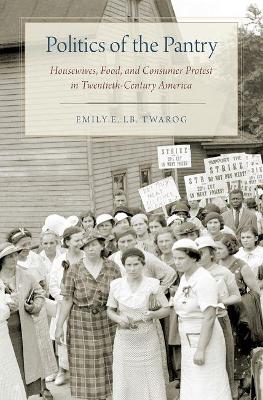The history of women's involvement in politics has focused most heavily on electoral politics, but throughout the twentieth century a far wider range of women has engaged in political activity when they found it increasingly challenging to feed their families and balance their household ledgers. The Politics of the Pantry examines the rise and fall of the American housewife as a political constituency group. It examines how working- and middle-class housewives'
relationship with the state evolved over the course of the century. Shifting the focus away from the workplace as a site of protest, it looks to the homefront...Read more
The history of women's involvement in politics has focused most heavily on electoral politics, but throughout the twentieth century a far wider range of women has engaged in political activity when they found it increasingly challenging to feed their families and balance their household ledgers. The Politics of the Pantry examines the rise and fall of the American housewife as a political constituency group. It examines how working- and middle-class housewives'
relationship with the state evolved over the course of the century. Shifting the focus away from the workplace as a site of protest, it looks to the homefront as a starting point for protest in the public sphere.
Emily Twarog has selected key moments when working- and middle-class women used consumer actions to embrace their socially ascribed roles as mothers and wives to demand economic stability for their families and communities. These include the Depression-era meat boycott of 1935, the consumer coalitions of the New Deal, and the wave of consumer protests between 1965 and 1973. She frames her narrative around the lives of several key labor and consumer activists and their organizations in both
urban and suburban areas - Detroit, greater Chicago, Long Island, and Los Angeles. This geographic and chronological span allows for a national story from the progressive politics of the New Deal to the election of Ronald Reagan and the emergence of the conservative right.
With a focus on food consumption rather than production, the book looks closely at the ways in food - specifically meat - was used by women as a political tool. These women both challenged and embraced the social and economic order, rather than simply being an oppositional force. And the domestic politics they engaged in, Twarog argues, were not simply the feminine version of labor activism nor auxiliary to the masculine solidarity of unions. Exploring the intersections of labor, community,
home, and the market, POLITICS OF THE PANTRY makes a strong case for the connection of the domestic sphere and the formation of women's political and class identity in America.
relationship with the state evolved over the course of the century. Shifting the focus away from the workplace as a site of protest, it looks to the homefront as a starting point for protest in the public sphere.
Emily Twarog has selected key moments when working- and middle-class women used consumer actions to embrace their socially ascribed roles as mothers and wives to demand economic stability for their families and communities. These include the Depression-era meat boycott of 1935, the consumer coalitions of the New Deal, and the wave of consumer protests between 1965 and 1973. She frames her narrative around the lives of several key labor and consumer activists and their organizations in both
urban and suburban areas - Detroit, greater Chicago, Long Island, and Los Angeles. This geographic and chronological span allows for a national story from the progressive politics of the New Deal to the election of Ronald Reagan and the emergence of the conservative right.
With a focus on food consumption rather than production, the book looks closely at the ways in food - specifically meat - was used by women as a political tool. These women both challenged and embraced the social and economic order, rather than simply being an oppositional force. And the domestic politics they engaged in, Twarog argues, were not simply the feminine version of labor activism nor auxiliary to the masculine solidarity of unions. Exploring the intersections of labor, community,
home, and the market, POLITICS OF THE PANTRY makes a strong case for the connection of the domestic sphere and the formation of women's political and class identity in America.
- ISBN10 019068559X
- ISBN13 9780190685591
- Publish Date 16 November 2017 (first published 13 October 2017)
- Publish Status Active
- Publish Country US
- Imprint Oxford University Press Inc
- Format Hardcover
- Pages 208
- Language English
